Part of the Digestion Phase
that we wrote about last week includes evaluating technology trends. We can identify a clear
set of winners: online video and online photo are taking off, vertical search engines are making great progress, MySpace and
Facebook are the new social phenomenon, etc. But not everything we have recently invented is working out.

I remember being in a cab in New York City listening to John Furier’s podcast coverage of DEMO 2006 and thinking it was nothing short of inspiring. Later that year when my company launched its own product at DEMOFall,
it was even more inspirational to be interviewed by John. So when I saw the news a few days ago that John leaving PodTech, I was particularly sad. Certainly things were complicated and the company was in trouble,
but the reason it was upsetting to me is because John is one of the major figures behind the podcasting movement.
PodTech has been doing much more than just podcasting, of course, but John’s departure leads to a question: What is going on
with podcasting in general? We certainly no longer hear about it as much as we did in the past. Is it because it simply became part of
our culture that we take for granted? Unlikely. It seems that podcasting has not really made it into our daily lives.
In this post we look at podcasting and try to decipher why it never got big.
Podcasts As An Evolution of Radio
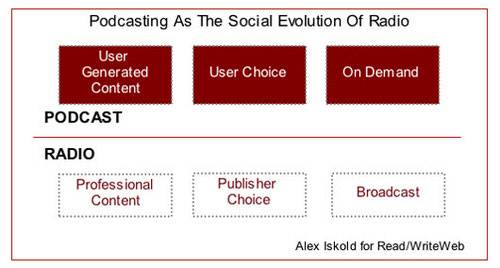
The original idea of a podcast was simple. Take the an audio broadcast (radio), let everyone do it (user generated)
and then throw it on top of RSS to let people consume the content on demand. Unlike the radio, which is programmed, limited
and sequential, podcasts are rich and can be consumed whenever people like. Technically anyone with a decent
microphone, a computer, and recording software can create a podcast. And since broadband is now widespread,
consuming large audio files over the web is no longer an issue. So when podcasting came onto the scene in 2004 it made a lot of
sense to many people and quickly became popular.
A Look At Podcasting As A Trend
But recently there seems to have been a decrease in enthusiasm over podcasts. Before we look into the reasons why,
lets take a look at these three trend graphs below and draw a couple of conclusions from them. The podcast trend appears to have stagnated, while
podcasting has just been going out of fashion at a steady clip. Podcasting as a trend seems to be
by far less popular than blog and video (although to be fair, video
may include more than online video).
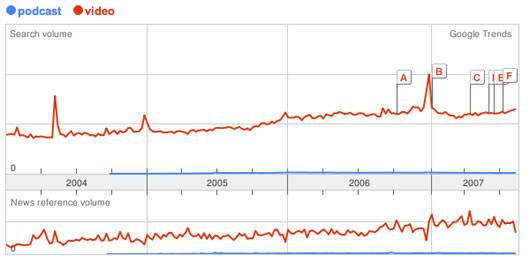
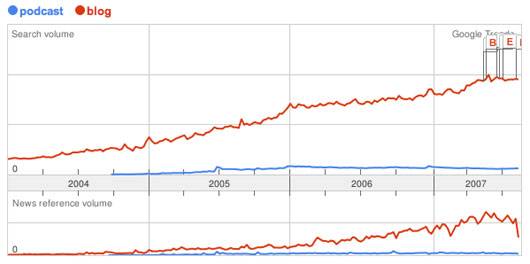
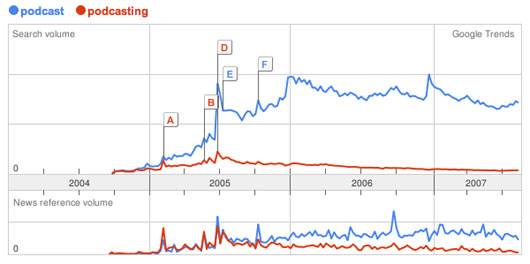
Why Podcasting Is Stagnating
Competition with Video and Blogs
The first trouble for podcasts is that they compete with online video and blogs. Videos are cooler, shorter, can be consumed
on demand, and satisfy multiple senses. Podcasts, on the other hand, are something you need to specifically listen to.
They typically consist of a discussion you need to be able to focus on to follow. As a result, podcasts can’t really compete with music, which is something that many of us can enjoy while working.
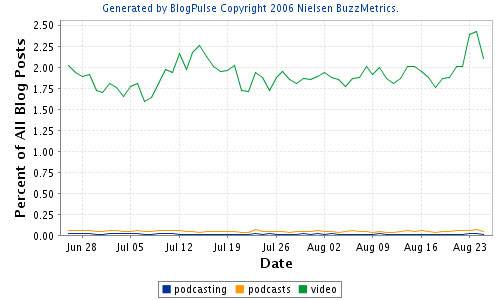
Blogs are also a threat, because people spend a lot of time reading them. Blogs and podcasts require different
levels of concentration. We can skim through blogs, but its harder to skim through podcasts. We are used to reading
web pages, but listening to a lengthy discussion without a visual is not something that we’re used to on the web.
Most radio content is music or news, so the content
itself and the format in which podcasts are delivered presents an adoption challenge.
Limited Applicability
The attention that podcasts demand presents another problem. When can we listen to them? It seems that the most natural
place would be while commuting, instead of listening to the radio. The only barrier there is that content producers need to keep
the content up to date. This isn’t a big barrier, because the updates happen automatically. So this works – we listen to
podcasts while commuting or traveling. That is, however, a rather specific and limited time and perhaps not a large enough window of attention to allow podcasts to flourish. And revisiting the content issue,
when we are coming home from work, do we really want to listen to a sophisticated discussion? Maybe not.
Monetization is a Challenge
As with any new medium there needs to be a path to revenue. Podcasts must rely on advertising to make money since it is very unlikely that many people would pay for them. The difficulty is measuring reach. Of course,
you can argue that consumption can be tracked through RSS subscriptions, but RSS measurement is a very inexact science and further, may not be
as appealing to advertisers who are likely to be biased toward web ads.
Another issue
is when to inject advertising in the podcast itself. Podcasters catering to a sophisticated early adopter audience that
might get quickly annoyed if presented with many irrelevant ads. The only model that appears to have worked well thus far is sponsorship, but how much money can be made this way?
Competition From Big Media
The last problem may be delivering the final blow to podcasting — competition from big media companies.
They all quickly figured out that recycling their audio content into podcasts is cheap and easy. So many of them have done just that.
NPR, CNN, and National Geographic, for example, make their content available as podcasts. Looking at what is
popular on iTunes we see very few independently produced podcasts, but rather a top downloads page that is dominated by the pros:
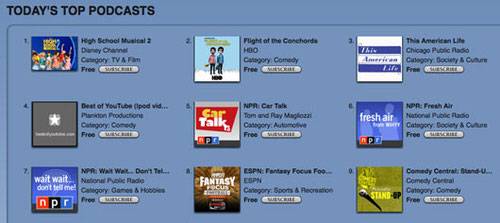
Conclusion
It appears that podcasts are not picking up steam, and rather, podcasting is actually slowing down.
There is not enough incentive for people to jump exclusively into podcasting because of tight competition
from video, blogs, big media and a lack of clear monetization methods. However, it does not mean that
podcasts are not here to stay.
One great thing that we already received from the podcasting revolution is choice. Media companies
were forced to micro chunk and give us their content on our terms. We now can consume it in whatever way that we prefer, whenever we
want it.
And even though podcasting is not likely to become as popular as user generated video, we
were lucky to get a generation of people who emerged as outstanding podcasters: Jason Calacanis,
Amber Mac and of course, John Furrier. No matter
what happens next with podcasting, what has been done is already important. Not necessarily in a huge way, but in a meaningful way.










